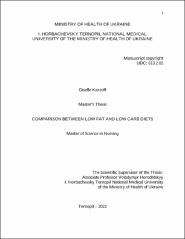COMPARISON BETWEEN LOW FAT AND LOW CARB DIETS
Короткий опис(реферат)
Low carb diets have been a topic for quite some time. Humans have been around for about 2.8 million years, and their diets have always been dominated by animal products. Many plants that we consume now were discovered and enhanced via cultivation and selection throughout the agricultural revolution, and as a result, plants can now fulfill most of our nutritional requirements. An agricultural revolution ushered in a new era in food production that considerably increased the quantity of nutrition from plant origin (mostly starch) and made cereals more palatable at the same time. Low-carb diets date back to the Olympic games in 776 BC, when athletes were encouraged to forego eating bread before competitions in order to save energy for training and competition. William Banting recounted his fruitless efforts to combat obesity and the assistance of physician William Harvey. Harvey helped Banting reduce weight rapidly. William Harvey was intrigued by the then-novel theory that starch (i.e. carbs) in the human body is converted to fat. In Harvey's opinion, the best way to lose weight was to stop drinking beer, eating sugary foods, and eating potatoes (fish and fatty meat). Banting was able to shed 46 pounds without resorting to deprivation. The diet he advocated became so popular that the term "banting" now refers to a low-carb diet. Such a diet is popular not just in the United Kingdom but across the world (Foxcroft, 2012).
Weight loss is achieved by the use of low-carbohydrate diets and reduced fat diets, which are the two most popular mainstream dietary patterns in the United States (Thomason 2016). When it comes to food options, the two diets might be rather different from one another, especially in the beginning. Low-carb and high protein diets, often known as ketogenic diets, place a focus on high-fat foods like bacon, nuts, steak, butter, and fried meals made with oil, while restricting carbohydrates like bread, pasta, and rice. If you're trying to lose weight, a low-fat diet is described as one in which the quantity of fat ingested in a meal is minimized and high-nutrient foods like whole grain breads, pastas, and rice are taken in favor of meals rich in fat and oil. Despite the fact that each diet has its own distinct tone, they all have one thing in common: they all aim to reduce weight and enhance general health. In both the low-carb diet and the low-fat diet, there is scientific evidence to support their claims that both diets may help people lose weight and have a healthy lifestyle (O'Neill & Raggi, 2020). In spite of this, studies have shown that each of these diets yields the same benefits, despite their completely different approaches to weight loss and overall health.

